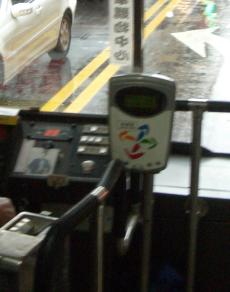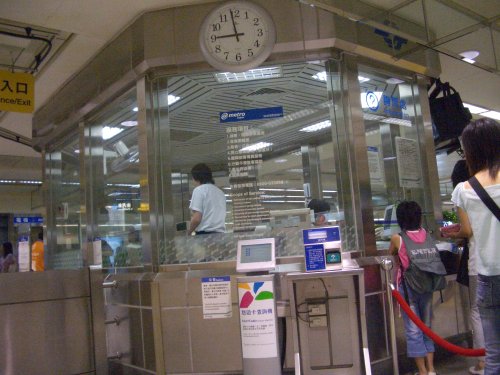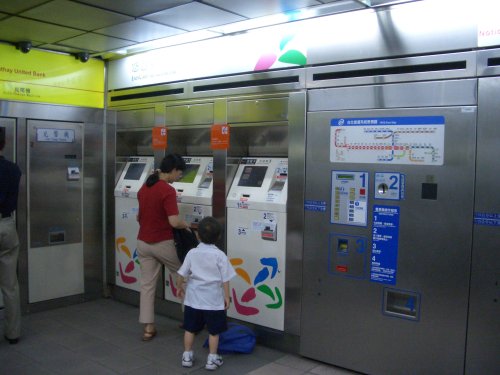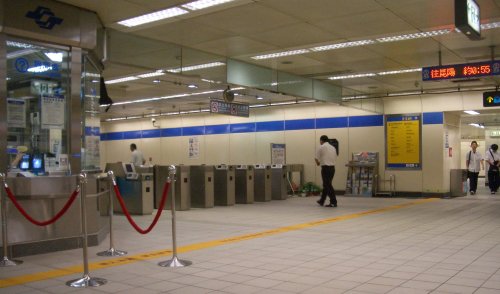 Wie die Verkehrsbetriebe in Taipei auf ihrer Webseite berichten (chinesisch/englisch) werden dort seit einigen Jahren berührungsfreie RFID-Tickets u.a. für den Nahverkehr eingesetzt. Die Technologie ist von Philips (Europa) und nennt sich Mifare, dort sind weitere Implementierungen verlinkt. Eine Flash-Animation verrät einige Details zur ‚Easycard‘ (per Pop-Up, daher nicht direkt verlinkbar; oben auf den Showcases-Link klicken). Mich interessierten v.a. die Erfahrungen, die damit gesammelt werden konnten. Bei meinem Aufenthalt in Taipei hab ich auch einige Fotos gemacht, die die Verbreitung und Verwendung der Technik verdeutlichen.
Wie die Verkehrsbetriebe in Taipei auf ihrer Webseite berichten (chinesisch/englisch) werden dort seit einigen Jahren berührungsfreie RFID-Tickets u.a. für den Nahverkehr eingesetzt. Die Technologie ist von Philips (Europa) und nennt sich Mifare, dort sind weitere Implementierungen verlinkt. Eine Flash-Animation verrät einige Details zur ‚Easycard‘ (per Pop-Up, daher nicht direkt verlinkbar; oben auf den Showcases-Link klicken). Mich interessierten v.a. die Erfahrungen, die damit gesammelt werden konnten. Bei meinem Aufenthalt in Taipei hab ich auch einige Fotos gemacht, die die Verbreitung und Verwendung der Technik verdeutlichen.
Solche Terminals wie oben auf dem Foto befinden sich in den Bussen und der U-Bahn, man führt dann beim Aus- und/oder Einsteigen seine Easycard direkt vor dem Gerät vorbei und darf dann durch.

In der U-Bahn gibt es Terminals im Eingangsbereich: einmal zum Nachsehen des Kontostands, gleich beim Auskunftsschalter, wo man bei Bedarf eine neue Karte bekommt oder eine defekte Umtauschen kann. Direkt gegenüber gibt es einige Terminals, die etwa so aussehen wie Bankautomaten, dort lädt man die Karte mit Bargeld oder per Kreditkarte nach.

Die Gesamtzahlen sind eindrucksvoll:
1.Taipei Metro:
62 stations on 6 service lines (i.e., Tamshui line, Hsintien line, Chungho line, Mucha line, and Pannan line) as well as car parks adjunctive to these stations2.Buses:
More than 100 terminals and about 4,000 ticket validators installed on buses of 14 bus companies3.Public Off-Road car parks:
31 public off-road parking lots of the Taipei City Government
Die zugehörige Technik befindet sich praktisch überall im öffentlichen Nahverkehr. In der Metro geht das über richtige Drehkreuze, die nach der Abbuchung entriegeln.

Die Easycard hat das typische Kreditkarten-Format, und man verwendet sie beim Ein- oder Aussteigen im Bus (je nach Linie und Tarifzone), und für die U-Bahn vor Betreten und nach Verlassen des Bahnsteigs.
Bei einer derartigen umfassenden und tagtäglichen Verwendung von RFID müssten sich doch einige Erfahrungen angesammelt haben. Dazu habe ich den Betreibern auf englisch folgende Fragen gestellt:
– When did you start using the RFID technology? Starting in early 2000, were you the first to employ it? Were there at all „competitors“ for introducing this modern technology?
– What reasons were discussed for using it in public transport, car parks, and potential other uses?
– The consortium promoting the EasyCard consists of a range of banks as well as Taipei transport and public bodies. In Germany, the teaming up of these organisations would be perceived highly unusual. Could you elaborate on how that partnership came about?
– Are there other planned uses on RFID technology besides the transport area? One European example: German officials have paved the way for using very thin chips in the next generation passports and national ID cards to be introduced in 2007. Other countries in Europe have announced similar plans.
– Berlin local transport authority was testing a similar system to the Taipei SmartCard in 1999, in a field test of 6 months duration. The real-life test was successful, they claim, but there still is no follow-up product. What „field tests“ with the ticket did you conduct, and what were the experiences? What was the response from the public?
– Given that one of the aims is to simplify ticket pricing, there will be security concepts „built in“ to prevent misuse of the tickets. Briefly, which ones did you implement?
– The press in Germany is begining to pick up the topic of technical specifications of RFID chips. This comes up concerning the football tickets specifially: each ticket is to be registered personally before purchase. Especially viable features are: – remote readability up to several meters and – the lack of any sort of write protection. How are these concers voiced in Taiwan? And what are your reactions? Or technical measures?
– Data protection laws are strict in Germany, which is most likely why Berlin’s electronic ticket is not yet out in the public. How do you regulate or control data access?
– Has there been any misuse of tickets, fraud or otherwise? If so, some figures or percentages would be helpful.
– What is the estimate cost saving efficiency of the system? Are there numbers on the overall cost?
– General: how many users does the ticket have? What distribution is there between for example, Taipei inhabitants and commuters using the ticket? What are the general usage numbers per day?
– General: the electronic systems used to process the data, is it (broadly) linux-based, or windows? Or neither? The terminals are probably embedded systems anyway, but technology-wise interesting.
– Any general data to supplement the answers will be appreciated, preferrably in English (Chinese will be okay, but slow to read).
These are the questions I have. I will be happy to come to your office for the interview on Friday, for I will still be available in Taipei, but equally fine to receive the answers by email – before Friday if possible, so I could call back in case I have questions on the material. Thank you for the cooperation!
Die Antworten sind interessant, weil ja auch in Deutschland diese Technologie eingesetzt wird; das erste große Presseecho kam mit den RFID-Tickets für die Fussball-WM 2006 und der amüsant vergeigten Aktion der Metro AG, ohne viel Aufhebens RFID in Kundenkarten einzufügen. Bemerkenswert auch, dass in Taiwan ein Konsortium aus Banken dem Ganzen unter die Arme gegriffen hat.
Zitat von der englischsprachigen Seite:
Taipei Smart Card Corporation (TSCC), founded in March 2000, consists of Taipei City Government, Taipei Rapid Transit Corporation,13 private bus companies, TAIPEIBANK, Mitac Inc., Taishin International Bank, United World Chinese Commercial Bank, Seaward Leasing Co., Chinatrust Commercial Bank, Mercuries Data System Ltd., China Engineering Consultants, Inc. and Solomon Smartnet Corp., Our mission is to integrate and operate a contactless smartcard ticketing system for buses, metro, and public off-road car parks in Taipei. It is a milestone in application of intelligent transport system in Taiwan. In the future, we will provide service into other transports, non-transport, etc., Thus, one EASYCARD can make your life easier.
Das mit dem Interview vor Ort hat dann nicht mehr geklappt, aber wo ich heute nochmal angerufen habe wurde mir zugesichert, dass in der kommenden Woche die Fragen beantwortet werden. Ohne das beabsichtigt zu haben ähnelt das hier inhaltlich dem Easycard-Artikel in der Wikipedia – den ich erst kürzlich gefunden (und gleich das Kartenfoto ergänzt und gleich kalte Füße wegen der womöglich urheberrechtlich geschützten Abbildung der Karte bekommen) habe. Mein Mehrwert hier kommt, sobald ich die Antworten aus der TSCC-Zentrale habe. Stay tuned.




0 Ergänzungen
Dieser Artikel ist älter als ein Jahr, daher sind die Ergänzungen geschlossen.